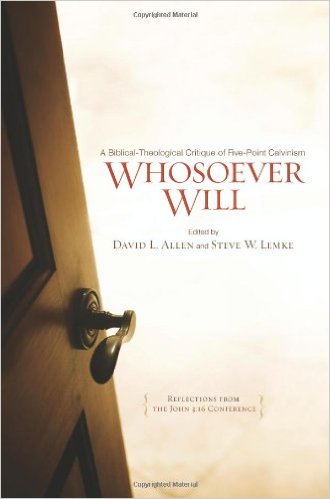Roger Olsen, Professor of Theology at George W. Truett Theological Seminary, associated with Baylor University, in Waco Texas is a self-described “five-point-Arminian.” I had the privilege of lecturing in one of his classes at Truett several years ago and found my time with him to be warm and cordial. We obviously disagree on the Arminian-Calvinism debate, but I remain deeply appreciative of his kindness to me and of his willingness to speak plainly not only about theological issues in general but also about his own views and where he fits historically.
It was with great interest that I read his review of David Allen’s and Steve Lemke’s book, Whosoever Will: A Biblical-Theological Critique of Five-Point Calvinism (B&H Academic, 2010). This edited volume is largely based on presentations from the John 3:16 Conference held in 2008.
Olson’s review, which appears on the Baptist Theology website of the Southwestern Baptist Theological Seminary, is worth reading. It is no surprise that he finds the arguments in the book to be so “devastating” that they “demolish” Calvinism. The upcoming issue of the Founders Journal will, again, unsurprisingly, take a different view. What I most appreciate about Olson’s review is its honesty and forthrightness. Southern Baptists ought to be willing and able to have rigorous theological discussions without mincing words. We should all seek to be honest with Scripture, theology and history. Whenever I read Olsen, I have no doubt that this is exactly what he tries to do, regardless of how significantly I may disagree with him.
Olsen calls the contributors to Whosoever Will “a collection of anti-Calvinist authors.” In fact, he goes on to describe them as follows:
The first essay is a sermon on John 3:16 by Jerry Vines. (Many of the essays are versions of papers delivered at a 2008 conference of Southern Baptists entitled “The John 3:16 Conference.”) There the author rehearses the history of Calvinism and the contemporary dispute over it and defends diversity about subjects such as predestination and free will in Southern Baptist life. As a classical Arminian I was stunned to read him saying of the conference and book that “none of the authors in this project is Arminian or a defender of Arminianism” (5). I was stunned because I read much of the book before going back and reading Vines’ sermon that introduces it. In fact, as I will discuss more later, all of the authors are Arminians in the classical sense. I don’t know why Vines and they run from the label. Perhaps because it has been so hijacked and misrepresented by Calvinists? But they don’t seem to be afraid of Calvinists. So, why so much distance from Arminianism? I can only assume it is because Vines, and perhaps some of the other authors, have bought into the pejorative polemics against Arminianism by its Calvinist enemies.
At the end of the published review online, the following editorial notation appears under the Editor’s Notes: “The authors of Whosoever Will would not describe themselves as “anti-Calvinists.”
Duly noted.























